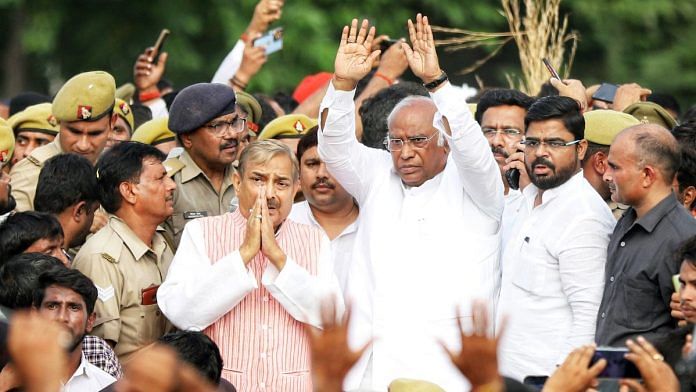New Delhi: On 19 October, Mallikarjun Kharge defeated Shashi Tharoor — securing 7,897 votes against the Congress MP’s 1,072 — and was elected National President of the Congress.
In becoming the 98th president of the 137-year-old Indian National Congress, Kharge has set quite a few records.
Only the sixth elected president and the third Dalit to occupy the post, he is also the first non-Gandhi president to ascend to the post after 24 years. Although members of the Nehru-Gandhi family were party presidents for 40 out of the 75 years since Independence — and for six years before 1947 — no Gandhi had to contest an election for the post, except once in 2000 when Sonia Gandhi ran against Jitendra Prasada.
ThePrint takes a look at the five leaders before Kharge who contested the party’s presidential elections and won.
Also read: 9,500 Congress delegates vote for 1st non-Gandhi prez in 25 yrs. Waited for this day, says Sonia
1939 — Subhas Chandra Bose vs B. Pattabhi Sitaramayya
Winner: Subhas Chandra Bose
Until 1939, Congress presidents were usually chosen through consensus. That year, party President Subhash Chandra Bose, going against Mahatma Gandhi’s wish, announced his intention to stand for the second time for president.
At the time, Congress presidents used to have a one-year tenure. Bose had been elected unopposed in 1938. In 1939, though, he faced a challenger in Gandhi-backed Pattabhi Sitaramayya.
The elections were fought amid growing differences between the Congress Left and Right leaders — Bose being from the left. He ended up securing 1,575 votes compared to Sitaramayya’s 1,376.
After Sitaramayya failed to win, Gandhi is said to have announced that the defeat was his personal defeat. However, it became increasingly difficult for Bose to continue given the opposition by Gandhi loyalists, prompting him to resign from the post about four months into his second tenure.
1950 — Purushottam Das Tandon vs Acharya Kripalani
Winner: Purushottam Das Tandon
Over a decade later, after Bose vs Gandhi, the elections were seen to be a Nehru vs Patel contest. Coming from the Congress’ Right, Purushottam Das Tandon was backed by Sardar Vallabhbhai Patel, whereas Acharya Kripalani was backed by Pt. Jawaharlal Nehru.
Tandon bagged 1,306 votes, Kripalani won 1,092. However, following growing differences with Nehru, Tandon eventually resigned.
Acharya Kripalani, on the other hand, left the Congress following his defeat and co-founded the Kisan Mazdoor Praja Party. It was also Kripalani who moved the first-ever no confidence motion on the floor of the Lok Sabha in 1963.
1977 — Karan Singh vs K. Brahmananda Reddy Vs Siddhartha Shankar Ray
Winner: K. Brahmananda Reddy
Dev Kant Barooah was the president of the Indian National Congress when the party was defeated in the 1977 general elections. Taking moral responsibility for the loss, he resigned.
Following this, three candidates threw their hats in the ring for the elections — K. Brahmananda Reddy, Siddhartha Shankar Ray and Karan Singh
With Indira Gandhi’s backing, K. Brahmanada Reddy won these elections by a wide margin. He secured 317 votes, Ray, 160 and Singh, 16. According to the book Indira Gandhi: Woman of India’s Destiny, “there were slogans to the effect that his victory indicated the victory of Indira Gandhi”.
This came at a time when Indira Gandhi was facing resistance within the party. The Congress saw many lobbies being formed during this period and Reddy defected from Gandhi’s group to the Barooah-Siddhartha Ray lobby in the party.
In January of 1978, it was Reddy (as the president) along with some senior Congress members, who expelled Indira Gandhi from the party when she split the Congress to form her own.
1997 — Sharad Pawar vs Sitaram Kesri vs Rajesh Pilot
Winner: Sitaram Kesri
Two decades later, a three-cornered contest was seen between Sharad Pawar, Sitaram Kesri and Rajesh Pilot.
Kesri, who had barely campaigned or got out of his bungalow, secured 6,227 votes. Meanwhile, Sharad Pawar and Rajesh Pilot, who campaigned the length and breadth of the country, secured 882 and 354 votes, respectively. Following the outcome, Kesri said, “The average Congressman doesn’t like to see his leader traveling in great style.”
As the president, Kesri had earlier been instrumental in the fall of the H.D. Deve Gowda government after the Congress withdrew its support.
Kesri’s downfall from the helm, though, was a quick one. Even though Sonia Gandhi virtually led the Congress in the 1998 Lok Sabha elections, Kesri was blamed for the loss. Congress had been restricted to 141 seats, whereas BJP formed the government with 181 seats.
Following this defeat, Sonia loyalists were quick to remove Kesri from the president’s post. A resolution was passed by the Congress Working Committee (CWC) to remove him — while he was locked in an AICC room from outside — and replace him with Sonia Gandhi. This marked a comeback of the Gandhis at the helm of the Congress after seven years.
According to reports, Kesri’s belongings were “sent away from the party office in a jeep, with a message for him to never return”.
2000 — Sonia Gandhi Vs Jitendra Prasada
Winner: Sonia Gandhi
The only time a Gandhi family candidate contested an election was in 2000 when Jitendra Prasada threw his hat in the ring against Sonia Gandhi for the party chief’s post.
Prasada was left completely isolated as soon as he filed his candidature. Only a handful of leaders were willing to be publicly seen supporting the former vice-president of the party against the Gandhi family candidate. Prasada had, on several occasions, questioned the fairness of the elections.
Sonia triumphed as the Congress Party president and more so as the face of the party during its turbulent times. She won 7,448 votes of the 7,543 valid votes, whereas Prasada, failing to reach triple figure mark, received 94.
(Edited by Zinnia Ray Chaudhuri)
Also read: Udaipur declaration is my manifesto, will concentrate on restructuring party, says Kharge



